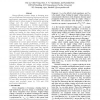Free Online Productivity Tools
i2Speak
i2Symbol
i2OCR
iTex2Img
iWeb2Print
iWeb2Shot
i2Type
iPdf2Split
iPdf2Merge
i2Bopomofo
i2Arabic
i2Style
i2Image
i2PDF
iLatex2Rtf
Sci2ools
108
Voted
MICRO
2003
IEEE
2003
IEEE
VSV: L2-Miss-Driven Variable Supply-Voltage Scaling for Low Power
Energy-efficient processor design is becoming more and more important with technology scaling and with high performance requirements. Supply-voltage scaling is an efficient way to reduce energy by lowering the operating voltage and the clock frequency of processor simultaneously. We propose a variable supply-voltage scaling (VSV) technique based on the following key observation: upon an L2 miss, the pipeline performs some independent computations but almost always ends up stalling and waiting for data, despite out-of-order issue and other latency-hiding techniques. Therefore, during an L2 miss we scale down the supply voltage of certain sections of the processor in order to reduce power dissipation while it carries on the independent computations at a lower speed. However, operating at a lower speed may degrade performance, if there are sufficient independent computations to overlap with the L2 miss. Similarly, returning to high speed may degrade power savings, if there are multiple o...
Related Content
| Added | 05 Jul 2010 |
| Updated | 05 Jul 2010 |
| Type | Conference |
| Year | 2003 |
| Where | MICRO |
| Authors | Hai Li, Chen-Yong Cher, T. N. Vijaykumar, Kaushik Roy |
Comments (0)

